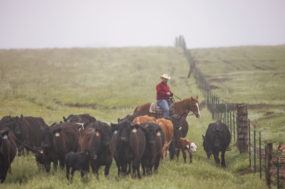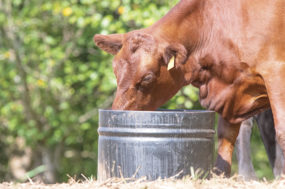Ranch horses are still a vital asset to many working ranches and those that do their jobs probably get treated just as well or better than more famous counterparts.
“A good nutrition program all year-round is probably the first step to keeping a well-conditioned ranch horse that is ready to work,” says Terry Stuart Forst from the Stuart Ranch of Waurika, Oklahoma.
This Centennial Ranch is a past Best Remuda winner and was recently inducted into the Oklahoma Quarter Horse Hall of Fame.
“Horses stay conditioned a lot better than we think. If you have paid attention to your nutrition program throughout the year and monitored body condition, those horses will be fit in no time,” says Dr. David Freeman, an equine extension specialist at Oklahoma State University.
Depending on the ranch’s philosophy, some horses will get some down time during the slower months on the ranch. Other outfits have a demand for use year-round or use the down time as an opportunity to prepare them for what is ahead.
“The concept of turning them out for a break is foreign to me. Our ranch horses are kept in shape year-round,” Forst says. “Maybe it’s not putting a lot of stress on them every day, but we’re prowling pastures or taking the opportunity to train them some more.
It’s obvious a person can’t run a marathon if they don’t eat right and prepare for it. It’s the same with horses – take it slow and leg them up. Get them in shape for the more active times.”
Nutrition plays a key role in maintaining fitness or a horse’s ability to get “back in the saddle,” so to speak. Just like most pro athletes have training camp, getting horses prepared for tougher days is probably not much different, but that athlete must be in good shape to be finely conditioned.
“If you have paid close attention to body condition and taken care of those horses during the downtime, it will take a couple weeks of riding to get them legged up and back in shape,” Freeman says. “It’s a building process – they are probably good from a cardiovascular standpoint but they need time to build flexibility and get used to the workload.
It’s a different deal if those horses have lost a lot of weight. It will take longer to get them back in shape and ready to work.”
“We like to keep our ranch horses in the same flesh year-round,” Forst says. “You can create a lot of problems if you use that horse hard before it’s in working shape.
Being consistent with our nutrition and making sure they have the proper conditioning for the upcoming workload helps eliminate a lot of problems.”
These equine athletes also need proper maintenance. Athletes undergo physicals and have supplements to help derive what the body needs. It’s no different with a ranch horse preparing for a summer of branding, gathering and shipping.
“Things like the farrier, deworming, vaccination and dentist work better as a yearlong routine,” Freeman says. Get in the habit of making sure you take the proper steps at the right time.
These are all things that will help those horses get ready to go to work a little quicker. You can see the feet and know they need work well in advance of the use season.
The threat of a disease or if that horse picked up extra parasites because the grass was short are a little harder to detect. Proper vaccination and deworming year-round takes that out of the picture.”
“We have to keep our horses in peak condition. They are an asset to the ranch,” Forst says. “Vaccination, deworming and proper minerals are important parts of doing what we can to make sure they’re up to the task.”
Ranch horses returning to a work schedule or maintaining a specific routine need a higher plane of nutrition than dormant or non-working counterparts. Meeting daily requirements will keep horses doing their job.
“A horse can usually get by pretty easily on forage alone if they aren’t working. When that horse goes back to work, energy requirements go up 30 to 40, maybe even 50 percent,” Freeman says. “It’s easier for them to handle the work more quickly if they aren’t having to replace what they normally had to begin with.
Best to look at those horses on a daily basis and make sure you are accurately evaluating body condition along with their stamina.”
Utilizing the nutrition program can help accomplish other things that fit into the program’s daily management scheme. Working with available resources will also help manage the remuda.
“Feeding pellets makes it easier to catch horses that we’re going to use. Typically, in a normal year, we don’t have to feed much hay during the spring and summer months because each camp has a horse pasture and they have plenty of grass to graze,” Forst says.
“Matching intake with outtake is very important. If those horses need extra nutrition, we like to provide high-quality hay. Horses were meant to graze all day and we try to replicate that. You get in a lot less trouble with a forage component than adding extra grain to the diet.”
“We like to replace pasture with forage or supplement when we use these horses. In a perfect world we would use forages, but this year has forced us to look at some other alternatives because hay may not be available or it’s too high-priced,” Freeman says.
“We have some very good supplements out there that pack a little punch in the protein and energy department, which is what we need. Decide what works best to help you manage your horse.”
Monitoring these things year- round positions the ranch remuda for success. Managing equine athletes with a lot of common sense goes a long way to being well mounted.
“Even if those horses are in good shape, if you’re having a really big day, maybe switch horses at noon. Sometimes we’ll switch out for the opportunity to ride another horse even though we didn’t use one up, and that keeps a horse from getting really tired,” Forst says.
“We have to do what we can to prevent injuries. If a horse gets sore, replace them and make sure if you put one under a lot of stress or heavy workload, there is adequate time to recover.”
“Have at least two horses in the trailer. Judge the level of fitness – it’s not how hard the horse can work; it’s how long,” Freeman says. “Work him until he’s tired and switch off. When they’re tired is usually when injuries occur.” ![]()
PHOTO
Well-maintained ranch horses that are on a year-round program that includes vaccinations and deworming will be ready to handle a more intense workload more quickly than a horse that is in poor condition or faces parasite and disease challenges. Photo courtesy of Cliff Mitchell.







